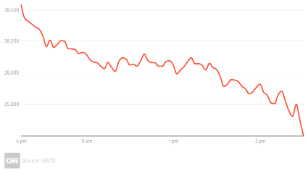The sudden sell-off can be explained in large part by looking at the bond market. Simply put, stocks are sinking as Treasury rates spike.
The
Dow plunged 832 points, or 3.2%, on Wednesday. Tech stocks took a beating, sending the Nasdaq tumbling 4% — its worst day since the
Brexit referendum of June 2016. Even Amazon (
AMZN) dropped 6%.
Over the past decade, Wall Street became addicted to easy money. Unbelievably low interest rates from the Federal Reserve encouraged investors to take risk by piling into stocks. Lower borrowing costs meant higher corporate profits.
That trend is now reversing, albeit for mostly good reasons: The American economy is really strong, and the Fed is raising rates to keep inflation in check and make sure the economy doesn't overheat.
It's a huge positive the Federal Reserve is no longer propping up the economy with near-zero rates. The Fed has raised interest rates eight times since late 2015. The central bank has even begun to
shrink its $4.5 trillion balance sheet.
As interest rates rise, investors have been getting out of bonds, driving down their price and driving up their yields. Investors are worried that their investments will be less profitable over time if inflation picks up.
The 10-year Treasury yield hit 3.24% on Wednesday for the first time in seven years. That's an about-face from 2.85% at the end of August.
2. The Fed is sticking to its guns
Stocks tend to slump after rapid rate spikes. Suddenly, stocks are getting competition from boring bonds.
Investors can now get a decent return from an ultra-safe government bond. That makes expensive tech stocks look like more of a gamble. Facebook (
FB), Netflix (
NFLX) and Twitter (
TWTR) all fell sharply on Wednesday.
If anything, the market turmoil reflects concerns that the economy could grow too fast, forcing the Fed to move aggressively to snuff out inflation. Last Friday's jobs report showed the US unemployment rate plunged in
September to a 49-year low. Wage growth, the biggest driver of inflation, has finally showed signs of life.
Fed chief Jerome Powell reinforced these worries last week by suggesting the Fed has a "long way" to go in its quest to return rates to normal levels. Powell said rates are not close to "neutral," the level where the Fed is neither hitting the gas nor the brakes on the economy.
In other words, it's full steam ahead for the Fed. Some investors — and even President Donald Trump — worry the Fed could be moving too quickly.
"I think the Fed is making a mistake," Trump told reporters in Pennsylvania on Wednesday. "They're so tight. I think the Fed has gone crazy."
3. Investors are worried about debt and China
Rising rates may already be pinching parts of the US economy, particularly housing and the auto market.
Rates are also going up because the US government is selling more Treasuries to pay for the soaring federal deficit. Washington is borrowing heavily to pay for the corporate tax cut and a surge of government spending.
The good news is that Corporate America is minting money right now. Third-quarter S&P 500 earnings are projected to soar by 20%. Strong profits could very well ease investor anxiety. That's what happened earlier this year when Treasury rates spiked, briefly spooking the market before cooler heads prevailed.
The major difference is that corporate profits are
expected to decelerate next year as the impact of the tax cuts fades. Record-high profits could get dinged by rising borrowing costs, wages and prices for raw material.
And then there's the trade war between China and the United States — the world's two largest economies.
The tit-for-tat tariffs threaten to hurt business confidence and delay investment. Citing the trade war, the IMF on Monday
cut its 2019 growth forecasts for the US and China. That won't help jittery investors.












No comments:
Post a Comment